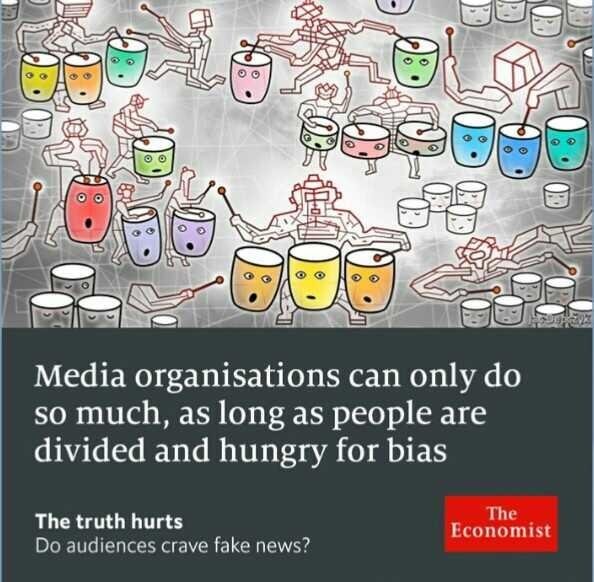Demand for lies and misinformation encourages media organisations to provide them.

THE theories lurk in odd corners of the web, occasionally bubbling into broader public consciousness. That President Donald Trump is working with Robert Mueller, for example, and preparing a hammer blow against the true threats to American democracy: Barack Obama, Hillary Clinton and their “deep state” allies. Such fabrications are not new. Yet the capacity of fake news to influence the outcome of political votes seems to have grown, and is provoking a backlash. France, for example, may soon allow judges to censor fake-news stories during election seasons. Malaysia’s government says it may jail those who publish or circulate fake news. Such steps risk enabling governments to limit legitimate speech (on April 3rd India’s government abandoned similar plans after widespread criticism). What is more, they are unlikely to do much to stem the flow of disinformation so long as there remains an audience of readers hungry for fakery.
Outrage over fake news is overwhelmingly targeted at the supply side: the creators and distributors of misinformation. That is understandable, since they are responsible for releasing half-truths and outright falsehoods into the wild. That impulse is also of a piece with the desire of many governments to improve the quality of material broadcast to news consumers. Plenty of governments subsidise highbrow fare, like sober news programmes and classical-music broadcasts, on the basis that they are public goods which lead to an informed, cultured population. Before 1987 America’s Federal Communications Commission enforced a “Fairness Doctrine”, which required broadcasters to give equal time to opposing sides on controversial issues. Some, including France, have strict laws against publishing material likely to inflame racial or ethnic tensions.
But the assumption behind these policies—that audiences are blank slates and easily steered by what they hear or read—is faulty. Rather, publishers both shape audience taste and also respond to it. For example, the political slant of newspapers tracks that of the regions they serve more closely than the leanings of their owners, according to research by Matthew Gentzkow of Stanford University and Jesse Shapiro of Brown University. Moreover, audiences often resist the attempts of news organisations to correct their misperceptions.
Brendan Nyhan of Dartmouth College and Jason Reifler of the University of Exeter asked participants in an experiment to read news stories on politically charged subjects, such as America’s search for weapons of mass destruction in Iraq. They found that more conservative readers were more likely to believe (wrongly) that such weapons had in fact been found. And details intended to correct such misperceptions not only failed to do so, but made conservative readers more convinced that their initial belief was right. The study is one of several to suggest that efforts by media organisations to check statements made by politicians, or by social networks like Facebook to slap warning labels on stories judged by independent fact-checkers to be misleading, are unlikely to solve the fake-news problem. Those who find the correction ideologically unpalatable will reason their way round it.
You might suppose that people would benefit from having the best available information and would quickly correct false beliefs when they are pointed out. Alas, humans are more complicated than that. Becoming well-informed takes time and money, and is more worthwhile in some cases than others. People take pains to consult credible sources before buying a car, for instance, so as not to spend large sums on a clunker. But a quick scan of the sports pages is all you need to prepare for conversation around the water cooler.
However desirable it might be that voters study the details of, say, different health-care systems, few will regard the effort as worth the investment, since a single vote is highly unlikely to swing an election. Instead they engage in “group learning”, gathering some information from what they read and watch but relying heavily on cues from friends, relatives, colleagues and others. The more members of a group reinforce each other’s Weltanschauung, the more sceptically they will view dissonant news reports—and, correspondingly, the greater is the economic incentive for news organisations to produce ideologically satisfying news, no matter how poorly it matches reality.
That is disconcerting in light of the ideological sorting in recent decades in many countries, notably America. Mr Gentzkow and Mr Shapiro reckon that face-to-face interactions among friends and neighbours in America are even more ideologically segregated than news consumption. The market for news is catching up, however. Readers can gorge on their preferred political content online, however dubious it may be. Mainstream media can also be guilty of creating separate, incompatible realities.
A recent paper by Gregory Martin of Emory University and Ali Yurukoglu of Stanford University examines the influence of Fox News, a right-wing cable-television channel, on American politics. Removing Fox from television in 2000 would have reduced the Republican share of the presidential vote by 0.46 percentage points, they estimate. But in 2008 Fox swung the race by 6.34 percentage points. Fox attracts viewers in search of ideologically palatable news and reinforces their views, they say. It pushes them rightward and then moves further right itself.
Deep threat
Supply-side solutions to the problem of fake news are not hopeless. The media business remains concentrated. Better behaviour by the giants, from Facebook to Fox, could limit the spread of untruths. But well-intentioned media organisations can only do so much, as long as a population is ideologically divided and hungry for bias and misinformation. Time to face facts.
Source: horizonasia.net